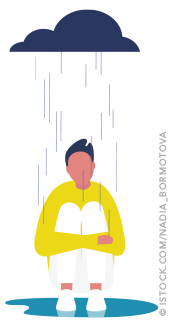
The power of family medicine is seeing patients as more than just signs and symptoms.
Fam Pract Manag. 2020;27(2):36
Author disclosure: no relevant financial affiliations disclosed.

My grandmother always said I was a “feeler.” She said I was like her in that regard and empathetic beyond my years. Ms. Graham, the elementary school librarian, told my parents I had a future in the theater thanks to my emotive reading. And in high school, I won a regional award for a poem the local newspaper described as “tortured.”
Being a “feeler” was an asset, until I reached high school. That's when it became a heavy burden. Activity and achievement became analgesics to the pain of emptiness I felt. I worked to suppress the nagging feelings of worthlessness by making myself indispensable to any club or team that would take me. Surely I could rid myself of the sense that I wasn't good enough if I was at the top of my class, right? My drug of choice was knowing who I was better than.
When I finally broached the subject of my melancholy with my pediatrician, he told me “kids don't get depression,” so I never brought it up to him again.
In college, things got worse. It wasn't unusual for me to stay in bed for days at a time or to suppress my feelings with an unholy mix of alcohol, Netflix, and carbohydrates. When I could no longer muster empathy, and I could barely muster the energy to bathe, I decided to see a psychiatrist. After a brief interview, he declared I didn't have depression because I had no suicidal ideation (SI), was performing well in school, and had recently gotten married. I only fit four of the DSM-5 criteria for major depressive disorder, not the five required to assign an ICD-10 code and bill my insurance.
My wife refused to accept this and made a next-day appointment for me to see her family physician. In him, I found an advocate and a liberator. After I explained my symptoms, this family physician told me the truth: “That really sucks.” In my later work as a hospital chaplain, I found that these are perhaps the most powerful words in bedside care — no sanctimonious explanations needed.
These days, my depression is well-controlled, and I am studying to be a family physician. The experience of being waved aside by a pediatrician and a psychiatrist only to find compassionate care at the hands of a family physician has been instructive. Two doctors looked past me and saw only a “well-appearing” 19-year-old male who “denies hx of SI.” The family doctor was practicing family medicine in its truest form, recognizing that when one member isn't well, it shakes the whole family. He saw me as more than a collection of tissues and systems, diagnoses and ICD-10 codes; rather, he saw me as a person with stories and regrets, hopes and fears, relationships and an inner life — an irreducible occasion of mystery, wonder, and care.
